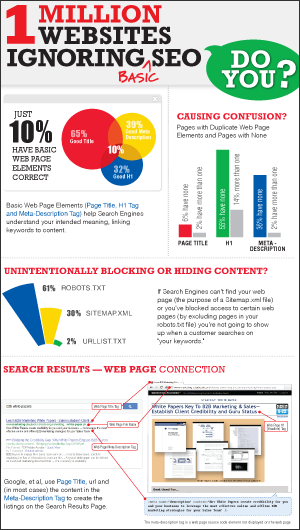Seems the top 1 percent get special treatment no matter the subject, even when it comes to search engine ranking.
If you happen to be one of the top sites on the Internet, you can ignore the fundamental optimization “rules.” You don’t have to worry about SEO minutia
like the rest of us. While we’re counting Title-tag character length, wondering if our Meta-descriptions are meaningful (or complete nonsense) and
rewriting H1 (heading) tags for the tenth time, the lucky 1% can rest easy.
We just finished analyzing 1 million home pages of the top 1 percent of all 141 million active websites* on the internet (see Infographic). We found that
just 9.6 percent had all three basic web page elements correct.
And yet, the 1-percenters are still on top. What gives?
Why 1-Percenters Can Ignore SEO
It turns out the vast majority of people are interested in content on the most popular, top 1% of sites.
This makes sense most of the time. For instance:
- If you search for insurance, most likely you want to see links to insurance companies like Allstate (#8299), State Farm (#5120), Progressive (#4103) or
Geico (#3031). ** - If you search for iPad, chances are you’re looking for Apple’s website (#36), a review on CNET (#100) or a used iPad on eBay (#23).
Not only does Google understand that what you’re looking for is probably on a 1-percenter website, they have a huge financial incentive to get it right.
Providing search results with links to those top sites is just too valuable to Google. [translation: Google wouldn’t be able to sell ads on the
right side of the page corresponding to the search results on the left side of the page]
To do its ranking, Google relies on the power of social media and the millions of inbound links to these top websites to make meaning of the content, even
when the website content does not follow fundamental SEO guidelines.
In other words, the sheer volume of inbound links to these 1-percenter sites more than compensates for messy content.
Why Your Site Cannot Ignore SEO
Odds are that your site is probably in the 99%:
- Your site shows up on page 6 when someone Googles “your keywords”
- 50 or fewer visits per day
- Alexa.com reports your site’s rank higher than 1,000,000
- Only a few sites link to your website
In your case, the main thing Google relies on IS the content on your web pages. If your content has been poorly formatted or is incomplete, guess what?
You’re likely to confuse Google’s indexing engine.
So yes, those title tags and H1 elements do matter!
This doesn’t mean your pages won’t get indexed. If Google can find your content they will index your website. It’s just that your big, important keywords
may carry a less weight in comparison to other content. And when that happens, your big, important keywords aren’t interpreted as important to Google.
Knowing What To Fix
If you’re curious to find out how you’re doing (or how your competitor’s website stacks up), I’ve set up a free site for you to generate an instant
scorecard of any web page at: http://FreeSEOScorecard.com
And full disclosure: I was part of the team that conceived and built FreeSEOScorecard.com
See how you do and report back.
Sources:
* 141 million active websites as reported by Whois Source (http://www.whois.sc/internet-statistics)
** Website rankings as reported by Alexa.com
Infographic provided by Venture Marketing under Creative Commons Attribution-NoDerivs 2.5 Generic (CC BY-ND 2.5)
<!–
Books by this author
–>
Follow John Fox on Twitter:
www.twitter.com/b2bmarketing
Article source: http://www.huffingtonpost.com/john-fox/seo-doesnt-matterto-the-1_b_1731039.html




